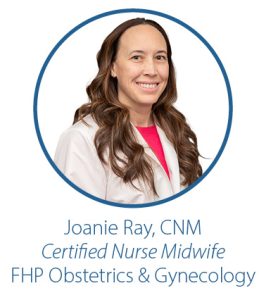

Fairfield Medical Center is proud to offer access to in-hospital midwifery services, an approach to birth and reproductive health that is rooted in empowerment and physiological processes.
Meet the Midwife
 Joanie Ray is passionate about providing personalized care to delivering mothers. For more than 12 years, she has served as a labor and delivery nurse at Fairfield Medical Center, where she has come to understand the vitally important role of patient support and advocacy. Her goal as a provider is to help women and families navigate the delivery experience in a way that feels safe, gentle and empowering.
Joanie Ray is passionate about providing personalized care to delivering mothers. For more than 12 years, she has served as a labor and delivery nurse at Fairfield Medical Center, where she has come to understand the vitally important role of patient support and advocacy. Her goal as a provider is to help women and families navigate the delivery experience in a way that feels safe, gentle and empowering.
Joanie’s healthcare career is extensive, having received an associate’s, bachelor’s and master’s degree in nursing. She is also licensed as a registered nurse and certified nurse midwife with the state of Ohio, and maintains certifications and training in basic life support, certified lactation counseling, inpatient obstetric nursing, electronic fetal monitoring, advanced life support in obstetrics, and Spinning Babies®, a physiological approach to preparing and caring for birth.
In addition to completing her CNM clinicals at Mount Carmel St. Ann’s and FMC, Joanie has served as a clinical instructor for the Mount Carmel College of Nursing for several years, sharing her knowledge with incoming nurses.
To learn more about midwifery services, call Fairfield Healthcare Professionals Obstetrics & Gynecology at 740-689-6690.
Now at Fairfield Medical Center, you can have the best of both worlds – the experience of a midwife-led delivery with the reassurance that a physician is close by if needed.
- A certified nurse-midwife, or CNM, is an advanced practice registered nurse that specializes in providing care during pregnancy, labor, birth, and postpartum. They are considered experts in the normal processes of childbirth and strive to protect physiological birth.
- The Midwifery Model of Care places emphasis on individualized care, utilizing evidence-based practice, shared decision-making and a comprehensive approach. Midwives closely collaborate with other healthcare providers when needed.
- CNMs have a college degree in nursing and a master’s degree in nurse-midwifery. Additionally, CNMs are registered nurses (RNs) who have graduated from an accredited nurse-midwifery education program and passed a national certification exam. Once licensed with the state, CNMs can work in all healthcare settings, including hospitals, birth centers, and offices or clinics.
- CNMs must complete both course work and hands-on education, which generally spans two to three years and includes nearly 700 hours in clinical practice with an experienced CNM and/or physician.
- Midwives are considered the experts in normal progressing, uncomplicated, low-risk pregnancies. OBs have a broader scope of practice and are also trained to manage high-risk pregnancies and perform surgical interventions (like cesarean sections) when necessary.
- Both received specialized training and are licensed and regulated by the state of Ohio. Both can prescribe drugs and provide safe and compassionate care.
- CNMs provide care during pregnancy, labor and delivery, and postpartum. CNMs can also provide reproductive care and primary care, including annual physical exams, birth control, menopause care, and screening and treatment for sexually transmitted infections. They can also provide lactation support and education.
- In the state of Ohio, CNMs must always have a collaborating physician available for any issues that arise. If there are concerns during your care, a physician will be available either in person or by phone for collaboration and consultation.
- Patients with low-risk, uncomplicated pregnancies are great candidates for midwifery care! Even patients with some medical conditions, such as hypertension or diabetes, could possibly be co-managed by both the CNM and the OB if desired.
- Visits with the midwife are similar to those you may have experienced with an OB. Some things you can expect during your visits include vital signs, blood work, ultrasounds, listening to your baby’s heartbeat and measuring your belly.
- Education is a key component of midwifery care, and any concerns or questions you may have will be reviewed and addressed on an individual basis.
- Midwives are well-trained to handle emergencies that may arise during your labor and birth, but there will always be a physician available in the event that you require care that is beyond the scope or expertise of a midwife.
- Like any provider, the CNM will do their absolute best to be available for your delivery, but in the event they are unable to attend, there will always be qualified providers available. Whether it is an FHP OB/GYN physician or the covering OB hospitalist, you and your baby will receive safe, compassionate care.